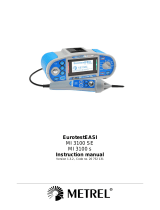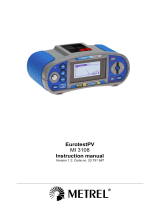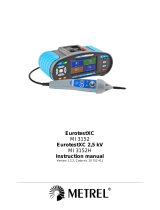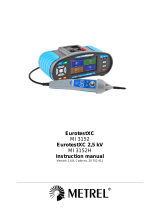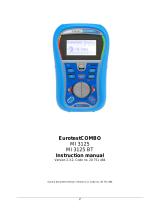Page is loading ...

Earth 2/3
MI 2126
Instruction Manual
Version 1.0, Code No. 20 750 190

2
Distributor:
Manufacturer:
METREL d.d.
Ljubljanska cesta 77
1354 Horjul
Slovenia
web site: http://www.metrel.si
e-mail: [email protected]
Mark on your equipment certifies that this equipment meets the requirements of the EU
(European Union) concerning safety and interference causing equipment regulations
© 2005 METREL
No part of this publication may be reproduced or utilized in any form or by any means
without permission in writing from METREL.

MI 2126 Earth 2/3 Table of contents
3
1 Introduction.............................................................................................................4
1.1 General description............................................................................................4
1.2 Warnings............................................................................................................4
1.3 Standards applied..............................................................................................5
2 Instrument description...........................................................................................6
2.1 Instrument casing..............................................................................................6
2.2 Front panel.........................................................................................................6
2.3 Connector panel................................................................................................7
2.4 Base..................................................................................................................7
2.5 Instrument messages........................................................................................8
3 Using instrument....................................................................................................9
3.1 Performing 3-wire measurement........................................................................9
3.2 Performing 2-wire measurement......................................................................11
3.3 General settings...............................................................................................14
4 Maintenance..........................................................................................................16
4.1 Batteries...........................................................................................................16
4.2 Replacing fuse.................................................................................................17
4.3 Cleaning...........................................................................................................17
4.4 Periodic calibration..........................................................................................17
4.5 Service.............................................................................................................17
5 Technical specification........................................................................................18
5.1 Functions.........................................................................................................18
5.2 General characteristics....................................................................................19
6 Standard and optional accessories.....................................................................20

MI 2126 Earth 2/3 Introduction
4
1 Introduction
We are very pleased to offer a high quality, professional grade test instrument, for
performing two- and three-wire earth resistance measurements, on which the estimation
of earthing quality is based. The equipment was designed and produced according to
many years of experience of producing and dealing with earth resistance and electric
installation test equipment.
1.1 General description
Earth 2/3 is a professional, hand–held, battery powered test instrument. It is intended
for carrying out earth resistance measurements in accordance with European standard
EN 61557 - 5.
The instrument is supplied with all accessories necessary for carrying out the tests.
1.2 Warnings
In order to ensure operator’s safety while carrying out various measurements and tests
using the Earth 2/3, as well as to keep the test equipment undamaged, it is necessary to
consider the following general warnings:
• symbol on the instrument means »Read the Instruction manual with
special care«. The symbol requires an action!
• If the test equipment is used in a manner not specified in this instruction
manual, the protection provided by the equipment may be impaired!
• Do not use the instrument and accessories if any damage is noticed!
• Service intervention or adjustment and calibration procedure must only be
carried out by a competent, authorized person!
• Never connect the instrument to high voltage (U > 20 V).
• Turn power off and disconnect any measurement accessory connected to
the instrument before opening battery cover.

MI 2126 Earth 2/3 Introduction
5
1.3 Standards applied
Earth 2/3 instrument is manufactured and tested according to the following regulations,
listed below:
Electromagnetic compatibility (EMC)
EN 61326
Electrical equipment for measurement, control and laboratory
use – EMC requirements
Class B (Hand-held equipment used in controlled EM
environments)
Safety (LVD)
EN 61010-1
Safety requirements for electrical equipment for measurement,
control and laboratory use – Part 1: General requirements
Functionality
EN 61557-1
EN 61557-5
Electrical safety in low voltage distribution systems –
Part 1: General requirements
Part 5: Resistance to earth

MI 2126 Earth 2/3 Instrument description
6
2 Instrument description
2.1 Instrument casing
The instrument is housed in a plastic enclosure, which maintains IP 40 protection class.
The casing consists of a main section, which includes the operator's panel and
connectors.
2.2 Front panel
The front panel consists of a custom LCD and a keyboard, see the figure below.
1
Earth 23
/
MI 2126
TEST
DISP
2
3
4
Figure 1. LCD display and front panel
Legend:
1 Custom LCD.
2 DISP key to display subresults.
3 TEST key to start measurement.
4 ON/OFF key to switch ON and OFF the instrument (auto OFF will occur
automatically after 10 minutes of inactivity).

MI 2126 Earth 2/3 Instrument description
7
2.3 Connector panel
Use original test accessories only!
Never connect instrument to high voltage!
H
S
E
1 2
3
Figure 2. Connector panel
Legend:
1 Blue – test terminal H
2 Red - test terminal S
3 Black – test terminal E
2.4 Base
R
EARTH
Ser.No
.
1
2
4
3
Ser.No.
5
F
u
s
e
Figure 3. Base

MI 2126 Earth 2/3 Instrument description
8
Legend:
1 Serial number.
2 Information label.
3 Battery cover.
4 Screw to fix battery cover.
5 Battery holder.
2.5 Instrument messages
Messages are generated on the LCD using special symbols and numeric segment
combinations. The following figure shows all of the possible display segments, and the
table below describes the messages.
Unit
Figure 4. Display segments
Description of possible display messages:
o.r. Result out of range.
and 20 V
External voltage is higher than approx. 20 V
eff
.
and RC
Current spike resistance is too high.
(push key DISP)
and RP
Potential spike resistance is too high.
and
Noise voltage is higher than approx. 3 V.
Fr General settings – selection of frequency (50 Hz or 60 Hz).
t ┌┐, t ┌ ┐ General settings – selection of measuring algoritm.
BAT Batteries are too weak – replace the batteries.
Table 1. Messages
Caution: if result of measurement is higher than 999 Ω, ohm character is not displayed.

MI 2126 Earth 2/3 Using instrument
9
3 Using instrument
3.1 Performing 3-wire measurement
The Earth 2/3 is able to carry out earth resistance measurement using three wire test
method.
The distance from the earthing electrode (black, E) to the current measurement probe
(blue, H) is at least 5 times the length of earthing electrode rod or the length of the band
electrode (see Figure 5).
If measuring the total earth resistance of a complex earthing system, the required
distance depends on the longest (diagonal) distance (d) between the individual earthing
electrodes (see Figure 6).
Step 1
• Connect test leads to the instrument and to the object under test according to the
figures below.
Figure 5. Connection of standard 20 m long test leads

MI 2126 Earth 2/3 Using instrument
10
Figure 6. Connection of optional 50 m long test leads
R
Earthtot
= R
E1
|| R
E2
|| R
E3
|| R
E4
R
E1..E4
Separate earthing resistances.
R
P
Potential spike resistance.
R
C
Current spike resistance.
R
Earthtot
Total earth resistance of tested earthing system.
Step 2
Press the ON/OFF key, the following menu will be displayed:
Ω
Figure 7. Earth resistance initial menu

MI 2126 Earth 2/3 Using instrument
11
Step 3
TEST
Press the TEST key and view test result. If
you want to perform more
than one measurement press the TEST
key and keep it pressed until
the result is stabilized, then release the key. The last result will stay
displayed.
DISP
Press the DISP key to check the resistances of both the potential (Rp)
,
and the current (Rc)
test probes. After a short period the main result
will automatically be displayed again.
Notes:
• When an external voltage higher than 20 V a.c. is present between blue (H), black
(E) and red (S) test terminals, the earth resistance measurement will not be carried
out after pressing the TEST key. The message 20 V will be displayed instead,
marked with symbol!
• If a noise voltage higher than approx. 3 V is present between blue (H) and black (E)
or red (S) test terminals, symbols ~ and will be displayed, indicating that the
test result may not be correct!
• The instrument does not indicate if a DC voltage is present at the input terminals.
• DC voltage have no influence on the measurement.
• If the resistance of the current or potential rod is too high (>(4 kΩ + 100xR
E
) or >50
kΩ, whichever is lower), then the result will be marked with symbol.
• If the test result is out of measurement range o.r. message will be displayed.
• Measured values of Rp and Rc are in kΩ.
3.2 Performing 2-wire measurement
The Earth 2/3 is able to carry out earth resistance measurement using two wire test
method.
Step 1
• Connect test leads to the instrument (red (S) and blue (H) together) and to the
object under test according to the figures below.

MI 2126 Earth 2/3 Using instrument
12
Figure 8. Two-wire test method – dependent objects.
Figure 9. Two-wire test method - independent objects.

MI 2126 Earth 2/3 Using instrument
13
Figure 10. Two-wire test method – TT network system method
Warning:
• Make sure that test leads are not connected to the phase line.
R
Earthtot
= R
A
+ R
O
+ R
X
R
x
Earth resistance.
R
A
Resistance of protective conductor.
R
O
Resistance of earthing electrode.
R
Earthtot
Total earth resistance of tested earthing system.
Step 2
Press the ON/OFF key, the following menu will be displayed:
Ω
Figure 11. Earth resistance initial menu

MI 2126 Earth 2/3 Using instrument
14
Step 3
TEST
Press the TEST
key and view test result. If you want to perform more
than one measurement press the TEST
key and keep it pressed until
the result is stabilized, then release the key. The last result will stay
displayed.
DISP
Press the DISP key to check the resistances of both the potential (Rp)
,
and the current (Rc)
test probes. After a short period the main result
will automatically be displayed again.
Notes:
• When an external voltage higher than 20 V a.c. is present between blue (H),
black (E) and red (S) test terminals, the earth resistance measurement will
not be carried out after pressing the TEST key. The message 20 V will be
displayed instead, marked with symbol!
• If a noise voltage higher than approx. 5 V is present between the blue (H) and
black (E) or red (S) test terminals, symbols ~ and will be displayed,
indicating that the test result may not be correct!
• The instrument does not indicate if a DC voltage is present at the input
terminals.
• DC voltage have no influence on the measurement.
• If the resistance of the current or potential rod is too high (>(4 kΩ + 100xR
E
)
or >50 kΩ, whichever is lower), then the result will be marked with
symbol.
• If the test result is out of measurement range o.r. message will be displayed.
3.3 General settings
There is usually voltage or current noise present on the earthing system under test,
caused by mains voltage somewhere in the near or far vicinity. Mains voltage frequency
is different between countries (e.g. 50 Hz in the European countries, 60 Hz in the United
States). In order to get stable test results, regardless of noise levels, it is advisable to
set the nominal frequency of the mains system.
The instrument measuring system assures excellent noise immunity. In extremely noisy
conditions, the stability of results can be further improved by means of averaging.
The frequency and algorithm, once set, will be effective even after replacing batteries.

MI 2126 Earth 2/3 Using instrument
15
Setting the frequency of mains voltage (50 Hz/60 Hz) and measuring algorihtm
Keep the TEST key pressed while switching on the instrument until Fr
followed by 50 or 60 value (last selected) starts to flash.
Hz
Figure 12. Selecting frequency
DISP
Select frequency of mains voltage.
TEST
Confirmation of mains frequency selection. Measuring algorithm type
starts to flash.
Normal algorithm (fast) Improved noise rejection algorithm (by
means of averaging tehniques)
Figure 13. Selecting algorithm
DISP
Select measurement algorithm.
TEST
Confirmation of measuring algorithm. The instrument is ready for
measurements.
Notes:
• In general it is recommended to use normal measuring algorithm because of the
instrument high intrinsic noise immunity.
• If the results are unstable improvements can be achieved by averaging, ie.
selecting the improved measuring algorithm. However, this prolongs the
measuring time significantly (up to 20 s).
• New selection of parameters is also offered after each reset of the instrument.
• If DISP key is pressed when switching on the instrument, the instrument will stop
responding (this function is used for special purposes). If this happens remove and
reinsert the batteries.

MI 2126 Earth 2/3 Maintenance
16
4 Maintenance
4.1 Batteries
The battery symbol - BAT in the lower right corner of the LCD indicates a low battery
state. If a low battery state is indicated, the batteries must be replaced to ensure
accurate measurements.
Observe the battery condition even when carrying out measurements. Results obtained
with low battery voltage will be marked with BAT after finishing the measurement (the
results may be incorrect).
The instrument is switched off automatically when battery voltage drops bellow the limit,
BAT is displayed for a few seconds before switching off.
Nominal power supply voltage is 6 V d.c.. Use four 1.5 V alkaline batteries, type IEC
LR14 (dimensions: diameter = 26 mm, height = 50 mm).
F
u
s
e
Ser.No
.
2
3
1
4
1
,
5
V
L
R
1
4
1
,
5
V
L
R
1
4
1
,
5
V
L
R
1
4
1
,
5
V
L
R
1
4
Figure 14. Correct polarity of inserted batteries
Legend:
1 Battery cover.
2 Serial number.
3 Fuse.
4 Battery cells.
One set of full-capacity alkaline batteries can supply the instrument for approx. 50
hours. Rechargeable NiCd or NiMH battery can be used instead of alkaline.

MI 2126 Earth 2/3 Maintenance
17
Notes:
• Replace all four batteries at the same time! Batteries must be of the same type.
•
!
Turn power off and disconnect any measurement accessory connected to the
instrument before opening battery cover.
• Insert the cells correctly, otherwise test instrument will not operate and batteries
may be discharged. See figure 14 for correct battery polarity.
• If the instrument is not used for a long period of time remove all cells from the
battery compartment.
4.2 Replacing fuse
The instrument contains a fuse to protect the instrument from damage if the bateries are
incorrectly inserted. See figure 14 for fuse location.
Warning!
•
!
Turn power off and disconnect any measurement accessory connected to
the instrument before opening battery cover.
• Replace blown fuse with original type only (M0.8A), otherwise the instrument
may be damaged or operator’s safety impaired.
4.3 Cleaning
Use soft cloth slightly moistened with soapy water or alcohol to clean the surface of the
instrument and leave it to dry totally before use.
Notes:
• Do not use liquids based on petrol or hydrocarbons!
• Do not spill cleaning liquid over the instrument!
4.4 Periodic calibration
Technical specification is warranted only if the instrument is calibrated at least once per
year by a competent service department. Contact your dealer for detailed information
4.5 Service
For repairs under warranty, or at any other time, please contact your distributor.

MI 2126 Earth 2/3 Technical specification
18
5 Technical specification
5.1 Functions
Earth resistance, two-wire method, three-wire method
Measuring range according to EN61557-5 is: 1.77 Ω ÷ 19.99 kΩ.
Display range (Ω) Resolution (Ω)
Accuracy
0.00 ÷ 19.99
0.01
20.0 ÷ 199.9
0.1
200 ÷ 999
1
1.000 k ÷ 1.999 k
1
±(2 % of reading + 10 digits)
2.00 k ÷ 19.99 k
10
±(5 % of reading)
Auxiliary earth electrode resistance R
C
100×R
E
or 50 kΩ (whichever is
lower), indicator only
Probe resistance R
P
100×R
E
or 50 kΩ (whichever is
lower), indicator only
Additional probe resistance error
at R
Cmax
or R
Pmax.
±(10 % of m. r.* + 3 digits)
Additional error at 3 V voltage noise (50 Hz / 60 Hz) ±(5 % of reading + 10 digits)
Automatic noise voltage indication threshold 3 V (<50 Ω, worst case)
Open-terminal test voltage < 40 Va.c.
Test voltage shape sine wave
Test voltage frequency 125 Hz / 150 Hz
Short-circuit test current < 20 mA
Automatic test of curr. and pot. test probe resistance yes
Automatic test of voltage noise yes
Accuracies apply for 1 year in reference conditions. The error in operating conditions
could be at most the error for reference conditions (specified above) +1 % of reading +
2 digits.
*m.r. measuring range

MI 2126 Earth 2/3 Technical specification
19
5.2 General characteristics
Power supply 6 V
DC
(4 × 1.5 V battery IEC LR14) or
4.8 V
DC
(4 × 1.2 V NiCd, NiMH)
Auto power off yes, approximately 10 min without activity
Visual warnings yes
Dimensions (w × h × d) 280 x 70 x 80 mm
Weight (without accessories and batteries) 410 g
Display custom LCD
Protection classification double insulation
Degree of protection IP 40
Working temperature range 0 °C ÷ 40 °C
Nominal (reference) temp. range 0 °C ÷ 35 °C
Max. humidity 85 % RH (0 °C ÷ 40 °C)
Nominal (reference) humidity range 40 % RH ÷ 70 % RH

MI 2126 Earth 2/3 Standard and optional accessories
20
6 Standard and optional accessories
See attached sheet to compare received set of accessories with listed one. The optional
accessories may be supplied upon request.
/




